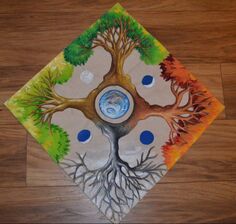|
I just came across a post on Facebook (from the Compassion Fatigue Awareness Project) that over 1000 caregivers in New York were surveyed, and most said the one thing they need most is help navigating all the services available, and help making decisions that face them in caring for their family members and loved ones. A link to the article is at the bottom of this post.
In my own case, I was lucky in many ways. Right after my father's death, when I was faced with caring for my mother, I was told by her doctor it was "medically unsafe" for us to live together. I had panic attacks, my mother would become hostile and paranoid, and at times she had psychotic episodes. Anti-psychotic medication helped with those, but the effect took months. In the meantime, caring for my mother could not mean having her live with me or vice versa. Another option had to be found. This might not seem to be a stroke of luck, but looking back, it was. I did not have the option that seems the most clearcut for most people, to try to keep my mother at home or have her move in with me. For most people facing decisions about their relatives with dementia, keeping them at home seems self-evidently the best possible choice, and any other option seems cruel, unethical or inadequate. We all are certain that we can somehow care for our loved ones better than strangers can. We know the foods they like, what TV shows they prefer, which clothes they want to wear. But with dementia, especially Alzheimer's, come changes that are invisible at first. I remember the day my mother decided to make herself an egg sandwich. She boiled a couple of eggs and didn't use a timer. When they were done, she peeled them, then put them on the bread and crushed the eggs with a fork. I don't know if she wondered why this sandwich didn't taste quite the same as egg sandwiches always had in her life. I just know that I was horrified. This was my mother, MY MOTHER, who had taught me how to boil eggs and make egg salad sandwiches, whose potato salad was the envy of many other mothers at picnics and potlucks. Who tried almost every recipe in Mastering the Art of French Cooking by Julia Child. A person can certainly survive by smashing boiled eggs onto a piece of bread, but the quality of life is no longer there. She was not capable of feeding herself beyond the basics. That was only one aspect of daily life she was no longer managing. I discovered later she was sneaking out of the house in the early morning to tell a neighbour I wouldn't let her watch TV or use the phone. She tried to sell the house one time when I went out for dinner. She accused me of trying to kick her out of her own house when I agreed to drive her to see her sister, after she'd cried every day for a week that all she wanted was to go and see her. All of these are situations that are commonplace for families of people with dementia, but when you're in them, you can't imagine how to cope. Calm discussions about how to make a proper egg salad sandwich, or who should cook dinner, were not something we could have at this point in her life. Being told it was medically unsafe for us to live together was a relief for me. An entire range of possible choices had just been taken off the table. I made a reservation for her to move into a new senior's residence that was just being built, but it would not be ready for a couple of months. In the interim, a friend found a group home an hour away, close to my mother's family, and she agreed to move there. Even though there were numerous concerns we had about it, it was the best possible place for her at that point. There were only a few residents. My mother got personal attention there and lots of interaction. They helped narrow down her more problematic symptoms and arranged for a specialist to see her, and she made a couple of pals there, who'd cajole her out of the worst of her sulky moods. I couldn't have done that. By the time her apartment was ready for her to move in, her medication was working and we had a clear diagnosis. I'd also had a chance to see a social worker for caregiver support, whose role was to help the elderly and their families navigate the system. We had time to explore decisions I needed to make, the pitfalls of being a caregiver, where to look for resources, how to handle my own emotions in dealing with my often unpredictable parent.. He didn't help me make decisions; he did help me find confidence in my own ability to make those decisions, and he affirmed the ones I did make. These days, more than two years after my mother's death, I try to help friends I see struggling with the same issues. Almost all of them run up against the same obstacles. They assume doctors are the only conduit for medical information, or that all services are accessible through their doctor. They get no support as a caregiver from their own doctor or their parent's doctors. And unless they themselves seek out information and help, it's almost never offered to them. But how do you know what to ask for, if you don't know it exists? Caregivers are rarely, if ever, given a timeline or flow chart of what has to happen first and who to contact to start the process. So, for example, the Department of Veterans Affairs will pay for housekeeping and other services for veterans and their families, but DVA needs an evaluation or diagnosis before they'll pay for medical care at home or in a seniors' residence. Delaying an evaluation by Home Care (as it's called in BC) because you think that means you'll need to use Home Care's services, or that it commits you to a specific course of action, can mean a delay in getting the DVA to cover a service your parent needs. Or the caregiver worries that there won't be enough money, only to find out their parent's income or assets are too high for them to qualify for certain benefits. Estate planning and management of financial resources is critical, and often beyond most of us. As a person who'd just been in the work force and had been married to a man who'd retired but was still below the age of transition from RSPs to RIFs, I had no concept of how to manage money for someone in their 70s. Stepping into my father's shoes as the person who handled all the money decisions for a senior was terrifying for me, even though my father had done his best to leave good records. I only went a short way down the road of dementia with my mother. A good friend had gone the whole way first with her mother-in-law, then with her own mother. The greatest gift she gave me was her humour and the sense that I wasn't alone in this, that someone else had been where I was. Her mother died 7 months before mine. She was well into severe dementia by then. My mother was, at worst, only moderately demented by the time she died. And I'd had tremendous support and help along the way, from the social worker/counsellor I mentioned, from doctors and the nurses at Home Care. I was headstrong enough and still young and energetic enough to ask questions, not simply take whatever I was told, to keep reading and looking things up so I knew what questions to ask. I listened to everything people had to tell me. I took a class on dementia caregiving, which was excellent. And I told every one I dealt with, "my mother has dementia," that I was handling matters I had no experience with, and I'd appreciate all the help they could give me. Almost no-one disappointed me. Not everyone who faces the task of caregiving is that strong. By the time a parent becomes frail or will allow themselves to be helped, the caregiver may themselves be ill or they have work pressures or other family obligations. Navigating the system was, at times, a full time job for me, and even when I wasn't actually on the phone or talking about my mother's care, it was on my mind. We need more people in the system, or who are familiar with the system, to provide help to caregivers. http://www.caregivers.com/caregiving/new-caregiver-survey-we-need-free-consultants/
0 Comments
|
JoAnn TurnerI'm easily amused. I try to be positive about things, yet I am also driven to distraction by irrationality. Especially if the purpose is valid, but could be achieved with less drama. You'll see all of this in my writing! Archives
April 2017
Categories
All
|
 RSS Feed
RSS Feed


